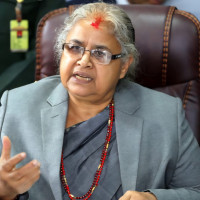- Wednesday, 4 February 2026
End Anomalies In Education System
Education sector reform in our country has, right from the start, struggled with the issue of quality, employment, teachers' involvement in party politics and decreasing pass percentage in SEE examinations. Negative attitude and hopeless mentality have fuelled mass youth exodus. Our educational institutions are blamed for producing incapable, incompetent, unskilled, and above all, unemployed youth finding little or no hope within the country. Education policymakers, planners, professionals and civil society need to reflect on what has gone wrong in our education system.
Major challenges have emerged other than insufficient investment in education, inadequate infrastructure, poor delivery, lapses in curriculum and teachers' capacity development. The proposed School Education Act is supposed to be a landmark in educational sector. But this much-awaited Act is yet to be passed from the parliament. Along with this Act, many more reforms, proposed by the lawmakers of different political parties, have promised to end disparities in our education system. To bridge the gap between education and the work force, the government has to prioritise reform agendas in order to improve employability and economic productivity.
Globalisation has pushed us into the battlefield to deal with many challenges ahead of us. We are talking about prosperity and way forward, but our educational policy is obsolete and dysfunctional. Our thinking, preparedness, investment are not in tandem with our ground reality. National interest is overshadowed by vested interest. Our plans and policies are not in tune with changing global scenario. So our destination is not definite. Where are we heading? It is not certain yet. Whether we reach to our mission envisioned by our constitution or is it merely a utopia?
In order to fully transform the ineffectual education system of our country, reform should focus on overcoming the negative mentality of the youth. A sense of professionalism should be cultivated in teachers. Federal government should intervene and take responsibility to reform educational sector. Reform should geared towards increasing public spending, which needs to be substantial in order to ensure that schools are well-funded and equipped with modern teaching resources.
Education for prosperity must be a priority. Using technology for remote learning and optimising digital education platforms can reduce some of the disparities in our educational system. Given the country's regional and cultural diversity, educational reform should be localised to meet the unique needs of each region while also ensuring alignment with the larger national goals.
Our education system should be guided by what sort of manpower has to be produced for the next 20 or 40 years. But we sorely lack vision and mission to this end. Reform agenda must be a part of the national education development plan based on needs assessment. A balanced approach, combining investment in infrastructure, teachers quality, curriculum and assessment reform and technology integration, could provide the foundation for a more equitable and effective education system in the country.















